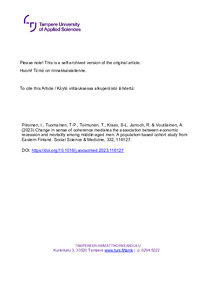Change in sense of coherence mediates the association between economic recession and mortality among middle-aged men: A population-based cohort study from Eastern Finland
Piiroinen, Ilkka; Tuomainen, Tomi-Pekka; Tolmunen, Tommi; Kraav, Siiri-Liisi; Jarroch, Rand; Voutilainen, Ari (2023)
Piiroinen, Ilkka
Tuomainen, Tomi-Pekka
Tolmunen, Tommi
Kraav, Siiri-Liisi
Jarroch, Rand
Voutilainen, Ari
Elsevier Ltd.
2023
Julkaisun pysyvä osoite on
https://urn.fi/URN:NBN:fi-fe2023080793267
https://urn.fi/URN:NBN:fi-fe2023080793267
Tiivistelmä
A financial recession has been associated with a decrease in all-cause mortality, but little is known about how psychosocial fluctuations in stress tolerance or orientation to life affect this association. Sense of Coherence (SOC) is a core construct in the Salutogenic Model of Health and is determined by generalized resistance resources and measures one's orientation to life by comprehensibility, manageability, and meaningfulness. We followed the mortality of a cohort of middle-aged Finnish men (n = 854) from the 1980s to the end of 2019. The cohort baseline was stratified into four age groups at baseline: 42, 48, 54, and 60. SOC was measured twice, at the baseline and at the 11-year follow-up visit. Between these SOC measurements, Finland confronted a deep financial recession, the effects of which were examined at the follow-up visit by questionnaires related to economic hardship (sum of nine items) and experience of the recession (one item). Using age group, marital status, employment status, and education as covariates, the change in SOC mediated both the economic hardship and the experience of recession relations to mortality: the indirect effects -19.57 (95% CI -43.23 to -0.92), and -26.82 (95% CI -59.52 to -0.61), respectively. Every one-point increase in economic hardship predicted about 2 and a half weeks shorter life expectancy, and those who experienced very strong disadvantages of economic recession had about 3 and a half months lower life expectancy by the end of 2019 than those who fully avoided the disadvantages. Furthermore, the younger age groups, 42 and 48, experienced the recession more severely than the older groups, 54 and 60. We conclude that following how orientation to life changes among middle-aged might be an informative approach after a recession.
